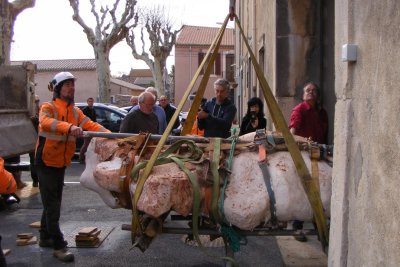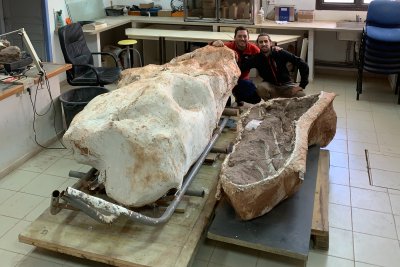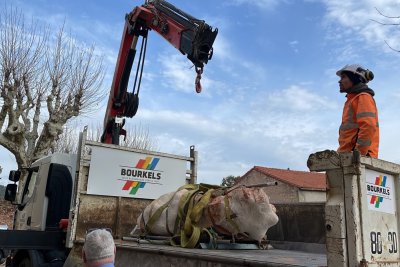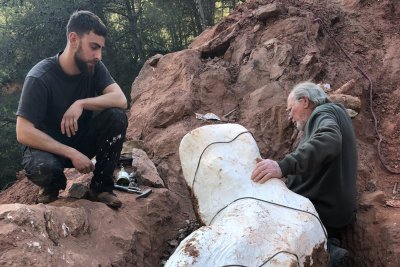A 70 million-year-old dinosaur bone found by a man walking his dog has turned out to be part of a near-complete dinosaur fossil.
The 25-year-old man, named Damien Boschetto, stumbled across the bone two years ago while walking in a forest near Montouliers, a town in Hérault, France.
After Boschetto—a paleontology enthusiast himself—reported his discovery to local researchers at the Cultural, Archaeological and Paleontological Association (ACAP) of the nearby town of Cruzy, it was found that the bone was just one part of a 30-foot-long fossilized titanosaur, which roamed the land over 70 million years ago.

"It happened one morning like any other, during an ordinary walk," Boschetto told local news FranceBleu in a translated quote. "While walking the dog, a landslide on the edge of the cliff exposed the bones of various skeletons."
"They were fallen bones, therefore isolated. We realized after a few days of excavations that they were connected bones," he said.
The fossil was eventually discovered to be around 70 percent complete, and part of the titanosaur family of dinosaurs that lived during the Cretaceous period, just a few million years before the dinosaur-killing asteroid hit and caused a mass extinction.
Titanosaurs, which include the famous brachiosaurus and diplodocus, are enormous, long-necked dinosaurs thought to be among the largest land animals to have ever existed
These herbivorous dinosaurs could reach lengths of up to 100 feet or more, with their elongated necks and tails, supported by sturdy vertebrae, allowing them to reach towering heights while grazing on vegetation.
This discovery was kept secret for two years, as the paleontologists were concerned that people would come to the site and steal or otherwise damage the bones. The titanosaur fossil was slowly extracted from the ground by volunteers at ACAP and has recently been taken to the museum in Cruzy.
"We did not publicize this discovery during the extraction of the most important parts of the first skeletons in order to avoid any damage. A continuous excavation was set up for two years, as well as several 10-day excavation campaigns with young scientists and students. The most complete specimen is a titanosaur which measures approximately [30 feet] long," Boschetto told Newsweek in a translated quote.





Several other fossils have been discovered in the same area of France, with over 25 new species having been uncovered nearby.
"The area around Cruzy is rich in dinosaur fossils and other species living at the same time. It has provided and constituted for 28 years one of the most important collections of Upper Cretaceous dinosaurs in France, in collaboration with numerous scientists from the CNRS and universities (Paris, Poitier, Montpellier, Lyon)," Boschetto said.
"The recent discovery of a new deposit in the neighboring town of Montouliers provides us with an assemblage of dinosaur skeletons in almost complete anatomical connections (the bones of the animal are still articulated to each other). This is a very rare and exceptional discovery in France and Europe."
The newly uncovered skeleton will be studied in depth at the Cruzy museum, and eventually put on display.
"In the commune of Cruzy we have a museum and a deposit/laboratory where all the collections are stored, prepared, inventoried, or exhibited (at the museum). Several parts of these skeletons have already been prepared or are being prepared for two years and already offer a great insight into the scale and quality of these new discoveries," Boschetto said.
Since the find, Boschetto has quit his job in the energy sector, and plans to obtain a master's degree in paleontology.
Do you have a tip on a science story that Newsweek should be covering? Do you have a question about titanosaurs? Let us know via science@newsweek.com.
Update 2/15/2024 12:48 p.m. ET: This article was updated with comment from Damien Boschetto.
Uncommon Knowledge
Newsweek is committed to challenging conventional wisdom and finding connections in the search for common ground.
Newsweek is committed to challenging conventional wisdom and finding connections in the search for common ground.
About the writer
Jess Thomson is a Newsweek Science Reporter based in London UK. Her focus is reporting on science, technology and healthcare. ... Read more





